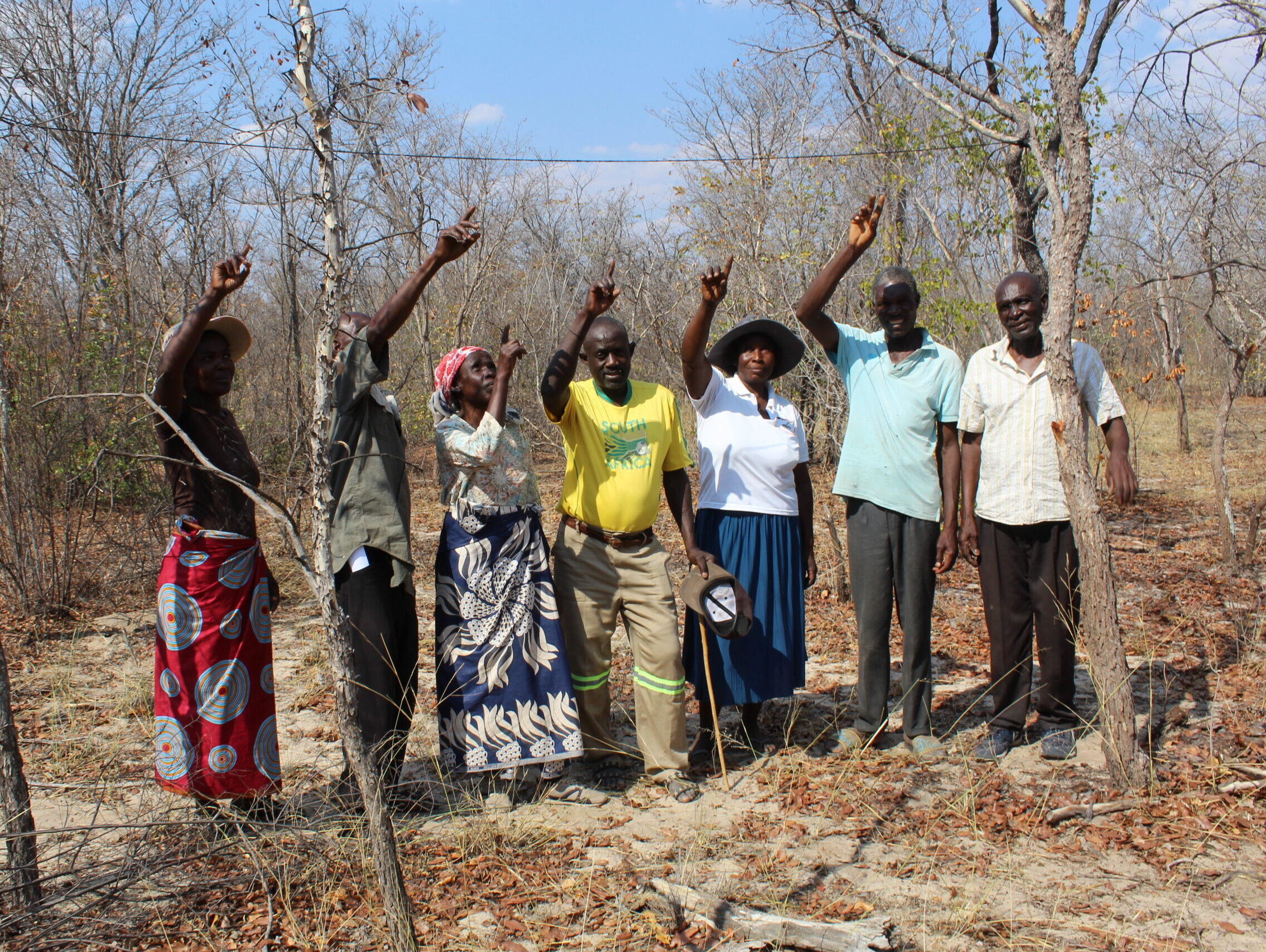Deterring Elephants With Chili Strings: Reducing Human-Wildlife Conflict
The Tsholotsho District of Zimbabwe is home to an abundance of wild animals that move about freely. The Matabeleland region, where the district is located and where the USAID’s Bureau for Humanitarian Assistance-funded Amalima Loko activity operates, is home to over 50,000 elephants.[1] Growing human and animal populations have increased pressure on land, food, and water resources, creating competition between wild animals and local residents such as Mark Neta from the village of Funda. Human-wildlife conflict is an ever-present concern, endangering both the people and the animals involved. Herds of elephants can trample huge areas of cropland overnight, destroying the main food and livelihood source for local residents.
“Elephants are the most problematic animals,” Neta said. “They destroy crops, and we would barely harvest.”
Trying to prevent this damage, Neta and other local farmers tried to scare them away through methods like beating drums.
“These efforts were, in most cases, in vain,” he said. “The elephants would still come.”
The implications of human-wildlife conflict for food security in the area were highlighted by Funda villagers during a Community Visioning exercise facilitated by Amalima Loko in late 2021. These sessions serve as forums where communities and their leaders can identify areas to prioritize and plan development interventions.
To support the community’s goal of reducing human-wildlife conflict, Amalima Loko worked with local leaders to explore new ideas for deterring elephants from destroying crops. This is when they discovered the chili strings method used in other regions. While some were skeptical of its effectiveness, the community decided to try the method anyway. This involved hanging chili-infused strings across known elephant routes near cultivated areas to deter their entry into fields. The strings were hung as part of a three-month pilot in three villages in April 2022.
To create the strings, chilis must first be dried for six weeks, then ground into flakes and immersed in a liquid solution for 36 hours. Elias Sibanda, one of 12 community members trained in this chili string method, explained the process of then diluting the flakes with used engine oil before immersing the strings in the solution. After this, the strings are ready for use.
“You do not block the elephant’s routes or corridors, but only at the point they divert into the fields,” he said. “We laid it 200 meters from the field.”
This proved to be successful, with participants noticing the elephants being put off by the smell of the fuel-immersed chilis.
“Since the strings were laid in April, we have seen elephants diverting their movement from our village,” Sibanda said.
Some respondents in focus group discussions described elephants backing up and stomping in frustration, but then turning and changing direction away from the chili strings.
Community leaders identified young men like Sibanda, who frequently encounter wildlife in their work as cattle herders, to receive training as scouts and first responders for elephant encounters. Training participants gained new skills and agency, positioning them as important resources within their community.
“I was selected on the basis of my local knowledge of the bush and my passion to serve my community,” Sibanda said. “Together with other scouts from other villages, we were introduced to the ‘chili strings’ technology. We despised this at first. How can a string deter something as big as an elephant? Surely this should be a bad joke—so we thought.”
However, participants report a marked reduction in elephant encroachment in the areas where the chili strings were in use, as elephants stayed on their main paths rather than diverting towards fields.
“We at least managed to harvest—thanks to the chili strings. We have not seen or witnessed an elephant invasion to date [after hanging the strings],” Sibanda said.
Preventing elephants from destroying crops improves food security, but also reduces close encounters between humans and elephants. This frees farmers from having to monitor their fields day and night and gives them more time for other livelihood activities. Villagers also reported that they can now travel safely to schools and health centers without having to fear dangerous elephant encounters as much.
“Elephants have been giving us problems,” Stabile Sibanda said. “We would sleep in the fields between March and June, guarding our fields.”
This particularly impacted women, with the fear of elephant encounters preventing them from carrying out daily responsibilities.
“We were afraid to go to the clinic to collect our medicines or even get the porridge for the six to 24-month-old children,” Stabile Sibanda said, referring to Amalima Loko’s Blanket Supplementary Feeding Program, which distributes food baskets of Corn Soya Blend Plus (CSB+) and vegetable oil to pregnant and lactating women and children under two. “[Before the introduction of the chili strings,] it was even difficult for us to enjoy the common wild fruits such as Msosobiyana. Elephants would ravage this nutritious delicacy. Women would be afraid to gather thatching grass—elephants would also destroy this grass. School children would not go to school whenever there were reports that the elephants were roaming around.”
Participants reported that the chili strings strategy was easy to implement and less laborious than previous efforts to discourage elephants. The community will need to complete a full cycle of planting and harvesting next year to gauge the final results of the pilot activity, but early observations have prompted communities to begin mobilizing resources and planting chilies to make more chili strings for the upcoming season.
While the chili strings method is showing promising initial results for deterring elephants, the community still has many challenges to contend with, including lions, jackals, and painted dogs. Addressing human-wildlife conflict requires intentional investment in good land use planning and adherence to grazing plans, as well as the development of effective early warning systems. Amalima Loko will continue to work with the Funda village and communities throughout the project area to address human-wildlife conflict and other food security and resilience priorities that have been identified through the Community Visioning process.
[1]https://www.cms.int/sites/default/files/document/cms_nlp_zwe_plan_elephant_2021.pdf



